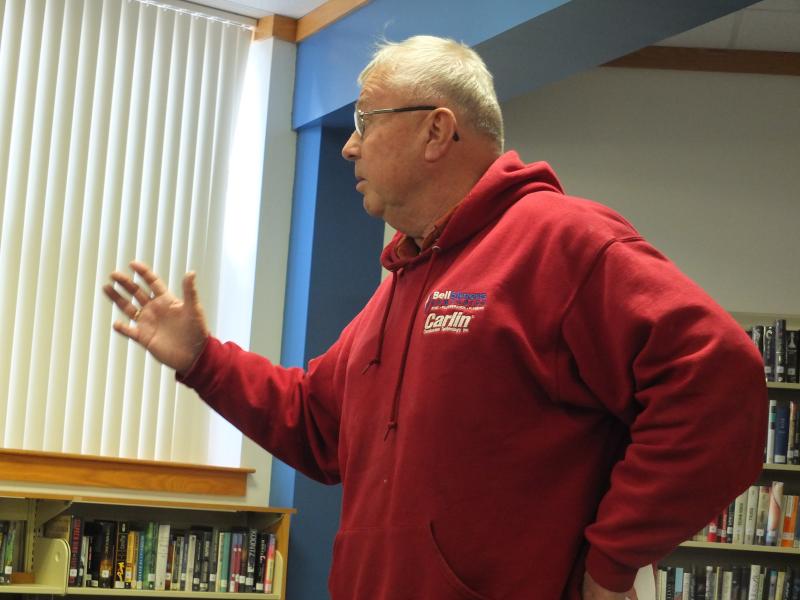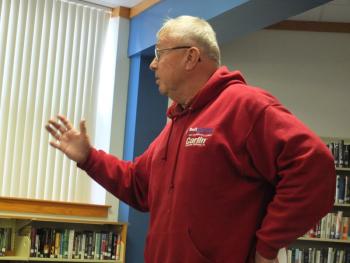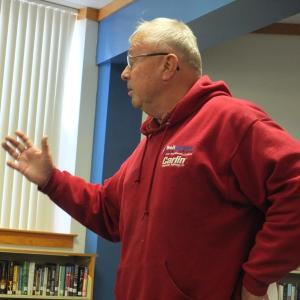Concern voiced over lead levels in Boothbay school district
 Jay D. Warren, retired safety engineer, voices his concerns regarding lead levels to trustees. MORGAN CALLAN ROGERS/Boothbay Register
Jay D. Warren, retired safety engineer, voices his concerns regarding lead levels to trustees. MORGAN CALLAN ROGERS/Boothbay Register
 Jay D. Warren, retired safety engineer, voices his concerns regarding lead levels to trustees. MORGAN CALLAN ROGERS/Boothbay Register
Jay D. Warren, retired safety engineer, voices his concerns regarding lead levels to trustees. MORGAN CALLAN ROGERS/Boothbay Register
Two people attending the Boothbay-Boothbay Harbor Community School District Board of Trustees’ meeting on Wednesday, April 5 voiced concerns over water samples found to exceed Environmental Protection Agency lead levels. The five samples were among 12 collected from both Boothbay Region Elementary School and Boothbay Region High School last week after students complained about the taste of the water.
The article published online in the Boothbay Register on Friday, March 31 detailed the circumstances and the steps being taken to rectify the situation. That article was followed by an article on the initial water quality test results published on the Register website on Tuesday. Both articles were on the front page of the print newspaper on Thursday, April 6.
Jay D. Warren, a retired safety engineer, asked the trustees where they were in terms of taking action. “I've dealt with lead problems in the state before. If you get lead in your body, it stays there and that's it. Are you testing kids for those levels?”
Trustee Chair Chris Buchanan told Warren the school has shut off all drinking water sources, provided bottled water, and brought in water dispensers from Poland Spring. “We've done a second set of tests and we're waiting on those results. We’re dealing with the situation,” Buchanan said.
“I think you're doing as much as you can at this point. But we don't want anybody sick,” Warren said. “How long has this been going on?”
“It's hard to tell. We realized we had the levels last Monday,” said Assistant Superintendent Shawn Carlson.
“I hate to see this. We have a beautiful school. I had all my kids go through it,” Warren said.
Summer Ball-Galvis, whose daughter is a special education student in Toby LeConte's class, also spoke at the meeting. “How often have you had the water tested at the school?”
“School systems like ours, tapped into a municipal water supplier, aren't required to test the water. But the town water is tested fairly regularly,” Carlson told her.
Ball-Galvis asked if the plumbing in the buildings was original and Buchanan explained that the main building, built in 1955-1956, has its original plumbing. The plumbing in the high school addition, built in 1997, is newer.
“So, theoretically, it could have been leaching lead since 1956?” Ball-Galvis asked.
“It's hard to say. It's the town water supply, so it's something generating within the buildings. We will resolve it, one way or another,” Buchanan said.
Ball-Galvis said that when she had visited LeConte's classroom, she was surprised to find that a faucet, deemed one of the five examples where lead levels exceeded EPA standards, was still in operation.
Buchanan told her the faucet would be disabled, if it hadn't been already.
After the meeting, LeConte, a special education teacher, was contacted regarding the status of water safety in her classroom. She said, “We were delivered a water dispenser the first day. We also had a case of water bottles delivered. Ed techs working with me have been filling cups of water for students when they need a drink because the bottles are a distraction. Students are always supervised and have not been drinking from the sink. We use the sink for clean up, doing household jobs, for washing hair and hands. If we cook and need water, will will use the water dispenser in the room or bottled water. We take this seriously.”
Ball-Galvis said she has requested a lead test for her daughter and wanted to know if the district is encouraging other parents to do the same.
Buchanan reminded her that the issue had been only recently discovered. “We've done everything we possibly can to this point – our initial goal is to solve the water issue. They are very minor levels. Hopefully, no children were affected by them,” he said.
“What we're intending until we get tests back is to make sure that nobody's using the water source. When the results come back, we'll spend time with professionals asking questions and gathering information. Right now, we're doing our best to get a handle on the situation,” Carlson said.
Warren and Ball-Galvis left the meeting at that point. Ball-Galvis told the trustees she would share the results of her daughter's lead test with school officials.
A discussion among the trustees followed regarding steps that have been taken to alleviate the lead issue and steps yet to be taken.
Carlson told trustees that after school officials spoke to the state, the school received 130 test kits and took samples according to EPA guidelines. He reiterated that each classroom has bottled water, and bubblers and fountains have been turned off, Poland Spring has provided water dispensers as needed, and those and the bottled water are being used for cooking and drinking.
Carlson believes solder used in the fixtures may be the issue, and if this is the case, the fixtures and faucets can be replaced. But he can't rule out the possibility the lead could be coming from elsewhere. Carlson said when tests results come back, the district will consult with an engineer to determine the source of the problem and action will be taken to correct the issue.
Event Date
Address
United States
























